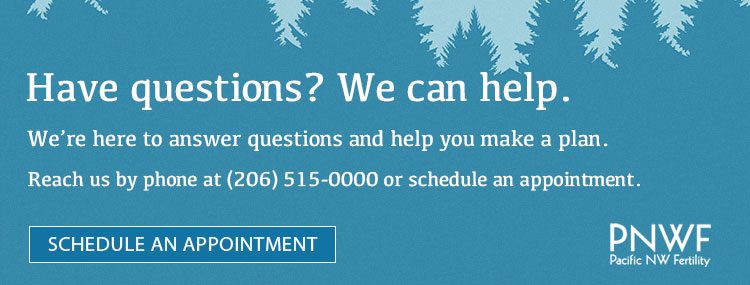Making Empowered Family Planning Decisions Starts with your OBGYN
If you’re considering building your family, the very best place to start is by scheduling a preconception appointment with your OBGYN to lay out all of your family planning questions. As with most things, the more answers you get, the more follow-up questions you’re likely to have. To kick off the conversation, here are 10 questions for your OBGYN that will help to lay the foundation for next steps. From there you can determine whether to pursue natural pregnancy or if you would benefit from scheduling an initial consultation with a trusted fertility clinic.
1. When should I stop taking my birth control after deciding to begin family planning?
Stopping your birth control is the first big step to take when you’re ready to begin trying for a baby. Discontinuing birth control can be a smooth process for some people. However, because birth control can affect your hormones and many different systems of the body, it’s important to do it with care. If you are on birth control for the treatment of heavy periods, cramps, or medical conditions such as polycystic ovary syndrome (PCOS) or endometriosis, it’s very important to consult your doctor before you stop taking it so that you can develop a plan together to manage your condition while off of birth control.
2. How should I manage my health while trying to get pregnant and while pregnant?
Building a family can be physically and mentally draining, and your doctor can help you approach it holistically so that you feel safe and supported throughout the entire process. If you do have an underlying medical condition, be sure to discuss with your doctor and understand the potential challenges you may encounter in getting pregnant and also being pregnant. Knowledge is power, and it’s helpful to begin the family planning process with an understanding of how you are going to handle potential obstacles.
3. Should I stop drinking alcohol if I want to get pregnant?
If you are trying to become pregnant naturally then it would be helpful for both you and your partner to stop drinking and using recreational drugs, which can have a negative impact on fertility. You should also discuss with your doctor if you are taking any prescription drugs, as some of these can affect fertility. It’s important to not discontinue any prescriptions without consulting your doctor, and this family planning appointment is the perfect time to bring it up.
4. Is age a factor in my ability to get pregnant?
This is a question on many people’s minds and if you are concerned about family planning and age, even if you’re not ready to start a family yet, your OBGYN should be a safe space to voice your concerns and discuss your options. Medically, pregnancies over age 35 are considered higher risk. Statistically, people have been having children progressively later in life for many years. Now, about 20% of female parents in the United States have their first child over the age of 35. It’s not uncommon to become pregnant either naturally or with fertility treatment well into your late thirties or even forties. However, there are associated risk factors and it may likely be more difficult. These are all family planning concerns that you can discuss with your OBGYN to figure out the best path forward for you.
5. Is anemia a concern while family planning?
If you have already been diagnosed with anemia then it is important to get on a consistent iron supplement and try to address it before becoming pregnant. Anemia is a red blood cell deficiency which affects the movement of oxygen throughout the body. Many people who become pregnant do become slightly anemic naturally, so if you are already prone to it then you and your doctor can keep tabs on it to make sure that your iron levels are strong as you begin trying to conceive. If you aren’t sure if you’re anemic you can do a simple blood test to find out.
6. Are there simple ways to increase my chances of getting pregnant?
There are many simple ways to help support your chances of conceiving when you start your family planning journey. Your doctor will likely recommend having intercourse during the most fertile times in your cycle when you are most likely to get pregnant. There are never any guarantees in family planning, but you can greatly increase your chances by tracking and understanding your periods and cycle so that you are consistently having sex when you’re ovulating.

7. Should my partner have their semen tested?
Approximately 50% of infertility cases are partially or entirely due to male factor infertility, which could include a case of low sperm, poor quality sperm, or no sperm in the semen. If you or your partner are concerned that this may be the case then your doctor may recommend testing; however, depending on your partner’s age your doctor might not recommend testing until after trying to conceive for at least six months. Sometimes patients opt to test earlier for peace of mind.
8. Should I undergo fertility testing?
Depending on your age and medical history and the age and medical history of your partner, your OBGYN may suggest that you wait to do fertility testing until you’ve already been trying for six months and haven’t had success. However, many people find it reassuring to test up front that if there are going to be clear obstacles to conception they can be addressed early on. Fertility testing is often not covered by insurance but you can talk to your doctor about the best family planning options for you and whether it feels necessary to do testing.
9. Should I be taking prenatal vitamins when I’m trying to conceive?
While some question the efficacy of vitamins that claim to help with conception, many doctors do recommend them. Consider taking a high-quality multivitamin that includes folic acid or a prenatal vitamin.
10. Should I modify my diet or exercise during family planning?
Depending on your unique health needs your doctor may recommend a certain diet. It’s important to eat healthy and exercise when trying to conceive. This means eating nutritious foods, avoiding substances, getting plenty of sleep, and committing to consistent, moderate exercise. Your body will have the best chance at conception if you and your partner are both staying healthy and minimizing stress. Being mindful of making healthy choices when possible, will help you to have the best chance at trying to start a family naturally.
Family planning is a massive, exciting life step and the most important part of starting the process is making sure that you feel supported and cared for by your medical team. You deserve to work with an OBGYN that you trust. If you do ultimately decide to do fertility testing or treatment, the team at PNWF is here to offer you that high quality support that each patient deserves. Reach out to schedule an initial consultation today to discuss your family-building goals.


